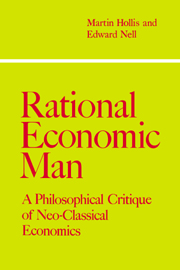Book contents
- Frontmatter
- Contents
- Preface
- Introduction
- 1 Relevance and falsification
- 2 Rational economic man
- 3 Theory and hypothesis
- 4 Facts and theories
- 5 Behaviour and prediction
- 6 A priori knowledge
- 7 Deductive explanation
- 8 The assumptions of neo-Classicism
- 9 Rationalist foundations for economic theory
- Bibliography
- Index
- Frontmatter
- Contents
- Preface
- Introduction
- 1 Relevance and falsification
- 2 Rational economic man
- 3 Theory and hypothesis
- 4 Facts and theories
- 5 Behaviour and prediction
- 6 A priori knowledge
- 7 Deductive explanation
- 8 The assumptions of neo-Classicism
- 9 Rationalist foundations for economic theory
- Bibliography
- Index
Summary
The primrose path is paved with good intentions. The Positive economist intended to discover empirical economic laws by testing the implications of his theories against the facts of the world. But he found that this meant rejecting good theories for bad reasons. So he refined his methods by offering instead to test implications against the true values of variables, as measured when ceteris were paribus. Disconcertingly, this left him unable to distinguish the failure of his predictions from the failure of his ceteris paribus conditions or the incorrect adjustment of his observations. For, to know that failure of a prediction is to be blamed on ‘other things’ not being equal, he had to have an independent measure of the ‘other things’ based on hypotheses already confirmed. Similarly, to blame the apparent failure on incorrect adjustment, he had to know independently the relation of observed to true values. To treat such claims to knowledge as synthetic was to create a vicious regress; to treat them as analytic was to turn intendedly synthetic prediction of what will happen into analytic deduction of what would happen, if … Theories became vacuous and laws undiscoverable.
Yet the primrose path is crowded with travellers. Able economists, both theoretical and applied, have accepted Positivism as their guide. They have been content to see it as an account of what they are doing, or trying to do and as a guide to what they ought to be doing. They have thus let Positivism cast them in an essentially passive role, ultimately as recorders and classifiers of correlations. (We shall offer them a more active role later, when we have finished with Positivism.)
- Type
- Chapter
- Information
- Rational Economic Man , pp. 47 - 64Publisher: Cambridge University PressPrint publication year: 1975



